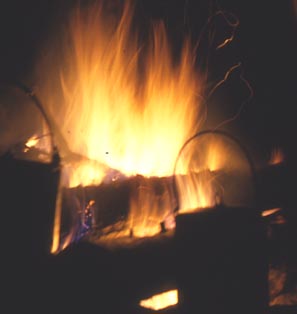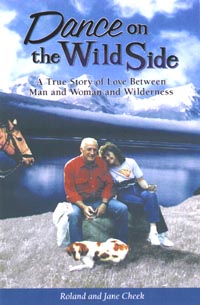a weblog sharing info on outdoor skills and campfire musing by a guy who spends a bunch of time in pursuit of both
CULTURE
WHERE -
TALES ARE TOLD OF
Welcome to Roland Cheek's Weblog
Roland is a gifted writer with a knack for clarifying reality. Looking forward to more of his wisdom
- Carl Hanner e-mail
When I say I believe in a Square Deal I do not mean, and nobody who speaks the truth can mean, that he believes it possible to give every man the best hand. If the cards do not come to any man, or if they do come and he had not got the power [skill] to play them, that is his affair. All I mean is that there shall not be any crookedness in the dealing.
[Where's Teddy now when we really need him?]
To access Roland's weblog and column archives
Tip o' the Day
The retired forest ranger told of his experiences taking a group of boys out to work as volunteers on trail projects. "There's nothing wrong with today's kids," the man said. "They're just as good as kids ever were. Our problem is we've emplaced a system that won't let them work."
He's right. It's easy to recall how naysayers of my youth claimed kids of that day weren't worth the powder to blow 'em to hell. Isn't it ironic those same kids who were so reviled in my youth are (now that they are grandparents) so critical of kids today?
Like the retired ranger, I believe in today's kids. I believe most of them want to work; want to do a good job; want to be respected (and praised) for their performance. Their problem--what my contemporaries believe mirrors laziness and an unwillingness to work--is the same problem of youth of any age: they have trouble seeing work that needs to be done.
I hired young guides back in the days when I led guests to adventure in some of the ruggedest lands in all the northern Rockies. Without exception, those guides came to my outftt with a willingness to work and a driving desire to please. What they lacked was experience. How could they they possibly understand the importance of adjusting an off-kilter pack before it rubbed a sore on the horse's back without first soring a horse? How could they know to mantie everything possible the night before pulling out for hunting camp without experiencing the time gain on the following morning?
They couldn't unless they were told. Then they still had to be shown how to accomplish it. But Lord did they know how to work! They worked from daylight to dark, day in and day out. They worked for little money and few material rewards. They worked for the sheer joy of "being" part of adventure, "because" of a zest for the outdoors, and "for" a love of wildlife.
The second half of the old ranger's critique constitutes a definite problem: that we've emplaced a system keeping kids from doing the kinds of quality work they'd like to achieve. Three "ell" words preventing them are laws, liability, and litigation.
I once read a truth I believe to be especially appropriate for this thesis. I don't know its source and my delivery may lack polish, but here it is: "Generation after generation, the very young do the impossible because no one bothered to tell them it is impossible."
That's my final word on the youth of today, except for this: There are three requirements for top performance for all people: 1) work at something you want to do. 2) be praised occasionally for a job well done; 3) receive a living wage.
If you are an employer and wish to receive top performance from your workers, pays special attention to 2) and 3).
LEVELING THE PLAYING FIELD
I read recently where eastern research made a huge breakthrough in isolating the agent responsible for America's citizens being raped, pillaged, and slaughtered in their homes and on their streets. At last! Psychoanalysts, laboring for lo! these many years in gloomy nonentity, has, through an intricate process known only to the socially correct, identified the disease. It's violence.
The breakthrough, as one might expect, has enormous implications. By ridding ourselves of our pernicious propensity to do mayhem, ours can be developed into a utopian environment. Think of it! We'll be able to stroll to the corner discount store at one a.m., buy a six-pack, and stroll home through darkened streets without any tiny worries furrowing our brow.
Though most of us already viewed violence as a problem, I'll be first to admit I did not recognize it as a "disease." I am not, however, alone. Cognizant of this weakness among we proletarian unwashed, Washington researchers pressed on until they not only diagnosed the disease, but isolated the agent--a deadly virus called guns! With that great leap forward comes the obvious solution: eradicate the virus. And so simple! Get rid of the agent; erase guns.
But (there's always a "but") the virus seems to have split into several manifestations: rifles for big game hunting, shotguns for bird hunting, sidearms for home use, AK-47s for foreign fields. Researchers freely admit to having trouble developing a broad-brush antidote to the virus in all its forms. Too, differences of opinion exists among researchers; some thoughtful diagnostics believe primitive forms of the virus may yet exist and could break out should suppression succeed beyond social reformers wildest dreams: say, zip guns made with lead pipe and rubber rands.
Okay, let's ban ammunition. Bullets are the real culprit. Guns are merely the vehicle, like rats and bubonic plague. Get rid of fleas, get rid of plague. So let's get rid of ammunition. That'll work, won't it?
Better first consider this: gunpowder is a mixture of potassium nitrate, sulphur, and charcoal. Curious Chinese discovered the combination a thousand years ago, then gave the secret away to the first travelling European salesman they encountered. Additionally, nitrocellulose (smokeless) gunpowder) was invented by a crafty Swede in 1845. So unless we reverse history and ban mankind's brain, banning guns and gundpowder in all its derivative forms seems patently unlikely.
So are we doomed to this disease called violence for all eternity?
Perhaps. Perhaps not. Some years ago, the city of Philadelphia tried to address their violence problem by offering $100 for each firearm turned in to City Hall. As one might imagine, the offer kicked off a selling stampede. After all, a C-spot from the town fathers beat street prices by a heady level. No doubt, the higher prices resulted in a brand-new cottage industry: importing turn-in guns from Baltimore and Trenton, and maybe even along the fringes of Capitol Hill.
A ten-year-old, I'm told, even turned in an Uzi for his $100. One wag cracked that the lad probably wanted to buy Black Talons for his Kalishnakov.
Even if possible, will rape, pillage, and slaughter be eliminated by eliminating guns? Not in a society tolerating rape, pillage, and slaughter. History tells us of Eric the Red and Ghengis Khan and Tamerlane; all were quite proficient at mayhem before guns came into common use by common people.
History also tells us of folks like Adoph Hitler and Pol Pot and Idi Amin who had the weapons market cornered inside their pieces of earth's real estate. It also tells how their followers raped, pillaged, and slaughtered commoners who had the misfortune to dwell under their thumbs without recourse to a level playing field.
If history ever tells us anything, it tells us the only real limits to sadistic urges of the bloodthirsty came only after guns leveled that playing field. You reckon that truth may have been common knowledge to our country's Founding Fathers when they made it every citizen's right to bear ams a fact of life, instead of a privelege reserved for the nobility?
Roland Cheek wrote a syndicated outdoors column (Wild Trails and Tall Tales) for 21 years. The column was carried in 17 daily and weekly newspapers in two states. In addition, he scripted and broadcast a daily radio show (Trails to Outdoor Adventure) that aired on 75 stations from the Atlantic seaboard to the Pacific Ocean. He's also written upwards of 200 magazine articles and 12 fiction and nonfiction books. For more on Roland, visit:
www.rolandcheek.com
Recent Weblogs
Tuesday, January 8, 2008
for more info about these and other Roland Cheek books
There's a bunch of specific info about Roland's books, columns, archives and radio programs. By clicking on the button to the left, one can see Roland's synopsis of each book, read reviews, and even access the first chapter of each of his titles. With Roland's books, there's no reason to buy a "pig in a poke."
for detailed info about each of Roland's books
Read Reviews
Read their first chapters
For interested educators, this weblog is especially applicable for use in history classes, as well as for journalism students.
Roland, of course, visits schools. For more information on his program alternatives, go to:
NEXT WEEK:
ENEMY AT THE GATES! WOMEN!
www.campfireculture.com
Too honest to deny its roots in hunting, but too human to be contained by its limits, The Phantom Ghost of Harriet Lou is a book for those who care about wildlife of all kinds.
Check out Roland's office: sun roof, daylight basement, and no parking problems. Short takes, sage wit, large humor, all gleaned from outdoors lifetime
Good grizzly mother? Or a savage killer. Your choice. An entire book about the life of a single charismatic grizzly bear
9 X 12 coffee table book about the best loved chunk of wild country in America: the place? Montana's Bob Marshall Wilderness . . . When? Then and now -- and always will be -- the way God made it.
source links for additional info
to send this weblog to a friend
to tell Roland what you think of his Campfire Culture weblog
to visit Roland's newspaper columns and weblog archives
- Theodore Roosevelt
To learn more of Roland's & Jane's exciting life as outfitters and guides in the Bob Marshall Wilderness, read Dance On the Wild Side
Learning To Talk Bear is Roland Cheek's best selling book -- now in it's 5th printing.
Safety in bear country? Of course! But this book also teaches the reader about the animals themselves.








